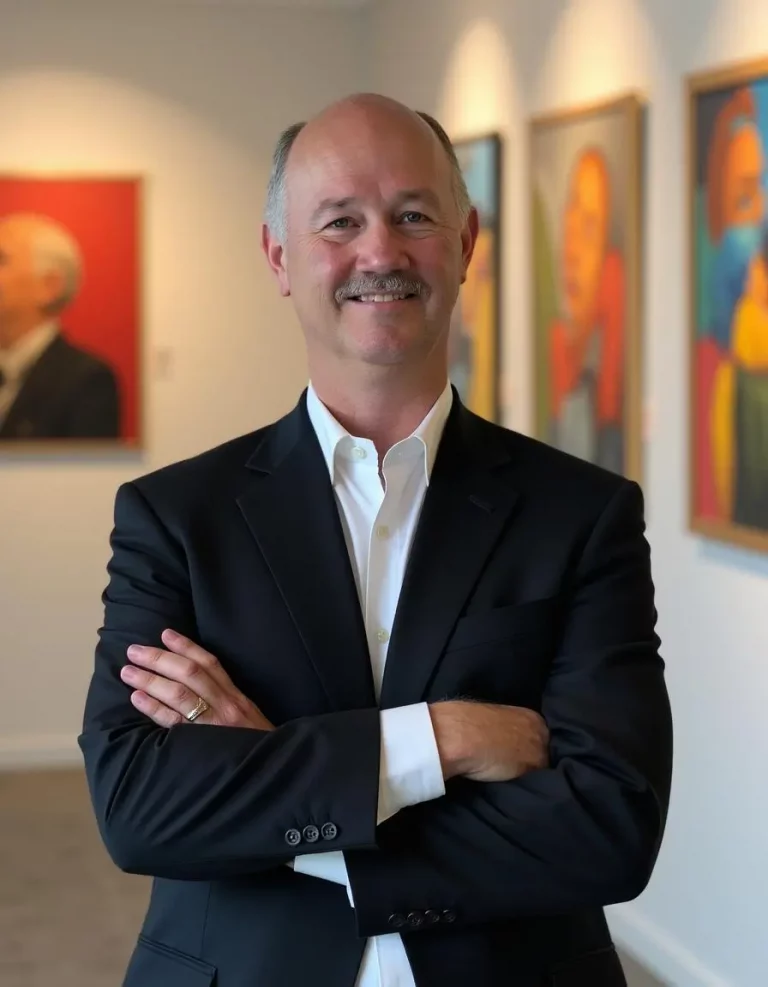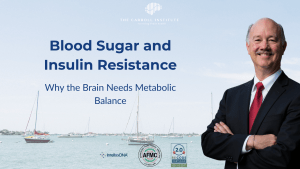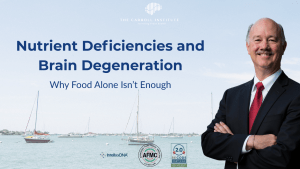Last Updated: October 2025
When most people think of “neurology,” they picture brain scans, medications, and diagnostic testing. While that’s certainly part of the picture, there’s another side to neurological care that focuses on rebuilding how the brain actually functions—this is called Functional Neurology. At The Carroll Institute in Sarasota, Dr. Garland Glenn, DC, PhD, AFMC combines Functional Neurology with traditional medical insights to help patients recover from brain fog, concussion, cognitive decline, and other neurological challenges. So, what makes Functional Neurology different, and how does it complement traditional medicine?
Traditional Neurology: Diagnosis and Disease Management
Traditional neurologists are medical doctors trained to diagnose and treat diseases of the brain, spinal cord, and nerves. Their role is critical in identifying serious conditions such as stroke, epilepsy, multiple sclerosis, Parkinson’s disease, or Alzheimer’s. Through imaging (like MRIs), blood tests, and neuropsychological evaluations, they look for structural damage or biochemical abnormalities that explain symptoms. As a result, traditional neurology excels at identifying the “what” and “where” of disease.
However, once a condition is diagnosed, treatment often focuses on symptom management—usually through medication or surgery. For example, a neurologist may prescribe drugs to reduce inflammation, regulate neurotransmitters, or prevent seizures. These interventions are invaluable when the goal is to control acute symptoms or slow disease progression. Yet many patients continue to experience lingering functional problems such as memory lapses, dizziness, or brain fog long after tests return “normal.”
Functional Neurology: Rehabilitation and Reconnection
Functional Neurology takes a different but complementary approach. Instead of focusing solely on structural damage, it looks at how the brain communicates within itself and with the rest of the body. In other words, it’s about how well your neurons are firing, integrating, and adapting to stimuli. When communication breaks down—whether due to injury, inflammation, or metabolic stress—the result can be slowed reaction time, poor concentration, or imbalance. Functional Neurology works to retrain and strengthen these pathways, helping the brain reconnect and function more efficiently.
Dr. Glenn uses detailed Functional Neurology exams to identify weak or overactive circuits in the brain. Once those patterns are mapped, he designs personalized exercises to stimulate underperforming areas while calming those that are overactive. This process encourages the brain to “relearn” efficient signaling patterns—a phenomenon known as neuroplasticity. Over time, these changes often lead to sharper focus, better memory, and steadier coordination.
Complementary Goals: How Functional and Traditional Neurology Work Together
Although they differ in focus, Functional Neurology and Traditional Neurology are not opposites—they’re allies. Traditional neurologists diagnose and manage neurological diseases. Functional neurologists, on the other hand, specialize in helping patients recover function after diagnosis or injury. Both perspectives are essential for comprehensive brain health. In fact, many patients benefit from seeing both: a medical neurologist to monitor disease progression and a Functional Neurologist to improve day-to-day performance and quality of life.
For example, a patient with post-concussion syndrome may visit a neurologist to rule out bleeding or swelling, and then work with Dr. Glenn to restore balance, focus, and reaction time through Functional Neurology. Similarly, someone with Alzheimer’s may receive medication from their neurologist but use Functional Neurology and the Bredesen ReCODE Protocol to stimulate memory circuits and address metabolic causes of cognitive decline. Together, these approaches provide both safety and long-term recovery potential.
Where Functional Neurology Excels
Functional Neurology shines in areas where traditional approaches often offer few answers—especially when brain imaging looks normal but symptoms persist. This includes:
- Concussion and mild TBI recovery — using targeted brain activation and sensory integration to restore communication.
- Post-COVID brain fog — improving oxygenation and metabolism with photobiomodulation and sensorimotor therapy.
- Balance and coordination disorders — retraining cerebellar and vestibular pathways through repetition and feedback.
- Neurodegenerative support — slowing cognitive decline by re-engaging memory and executive function networks.
At The Carroll Institute, these methods are enhanced by technologies such as the Neuronic Photobiomodulation Helmet—which improves blood flow and energy production in the brain—and the Neurosensory Motor Integrator (SMI), which retrains timing and coordination. These tools, supported by evidence from Science Advances (2022) and RKB Instruments, make it possible to activate neuroplasticity safely and effectively.
Why The Carroll Institute Model Is Unique
Dr. Glenn trained under Dr. Ted Carrick, founder of the Carrick Institute and the father of Functional Neurology. With more than 500 hours of advanced training, Dr. Glenn blends Functional Neurology and Functional Medicine to address both the structural and metabolic dimensions of brain health. As Sarasota’s only ReCODE-certified Functional Neurology center, The Carroll Institute provides an integrative model that evaluates brain performance, oxygenation, hormones, and inflammation all at once.
This approach does not replace traditional care—it enhances it. Patients are encouraged to maintain their relationships with neurologists and other medical providers while using Functional Neurology to strengthen communication within the nervous system. By aligning both methods, patients often experience faster recovery, improved mental clarity, and greater long-term resilience.
When to Consider Functional Neurology
If you’ve already seen a neurologist but still feel like something isn’t quite right, Functional Neurology may be the missing piece. It’s ideal for patients who are still struggling with issues such as dizziness, focus problems, memory lapses, or fatigue—even after receiving normal imaging results. In many cases, these symptoms come from communication problems rather than structural damage, which can often be improved through targeted stimulation and retraining.
Whether you’re recovering from an injury, managing cognitive decline, or working to prevent future problems, Functional Neurology can help you strengthen your brain’s adaptability and improve daily function. Book a Discovery Call with The Carroll Institute to learn more about how personalized brain rehabilitation can help you move forward with confidence.
Sources
- Functional Neurology Overview — The Carroll Institute
- Reversal of Cognitive Decline — NIH (2014)
- Photobiomodulation Enhances Brain Function — Science Advances (2022)
- Neurosensory Motor Integrator — RKB Instruments
- Precision Medicine and Alzheimer’s Care — NIH (2023)
Medically reviewed by Dr. Garland Glenn, DC, PhD, AFMC (Advanced Functional Medicine Clinician)
The Carroll Institute — Sarasota, FL
Learn more about Dr. Glenn’s background and credentials: About Dr. Garland Glenn
This content is for educational purposes only and does not replace personalized medical advice.

Dr. Garland Glenn, DC, PhD, IFM, AFMC
Founder & Clinical Director, The Carroll Institute — Sarasota, FL
Dr. Garland Glenn is a board-certified chiropractic physician and functional medicine practitioner specializing in cognitive health, neurodegeneration, and root-cause medicine. Certified as an AFMC (Advanced Functional Medicine Clinician) and Institute for Functional Medicine (IFM) trained, he has also completed over 500 hours of advanced training in Functional Neurology under Dr. Ted Carrick, founder of the Carrick Institute.
At The Carroll Institute, Dr. Glenn leads Sarasota’s only ReCODE-certified Functional Neurology program, helping patients reverse or prevent cognitive decline through the Bredesen ReCODE Protocol, neuroplasticity exercises, and personalized functional medicine care.
Learn more about his background and approach at About Dr. Garland Glenn.
– schedule now –
free discovery call
To help you get started, we offer a free 20-minute Discovery Phone Consultation. During this call, you will be able to talk with one of our Certified Brain Health Coaches about what going on with you or your loved one and find out if we can help. Please review our FAQs prior to scheduling your free call. We look forward to talking with you soon and helping you Save Your Brain.
(yes, it’s totally free!)
ReCODE® is a registered program developed by Dr. Dale Bredesen and licensed through Apollo Health. Dr. Garland Glenn is a certified ReCODE practitioner.



